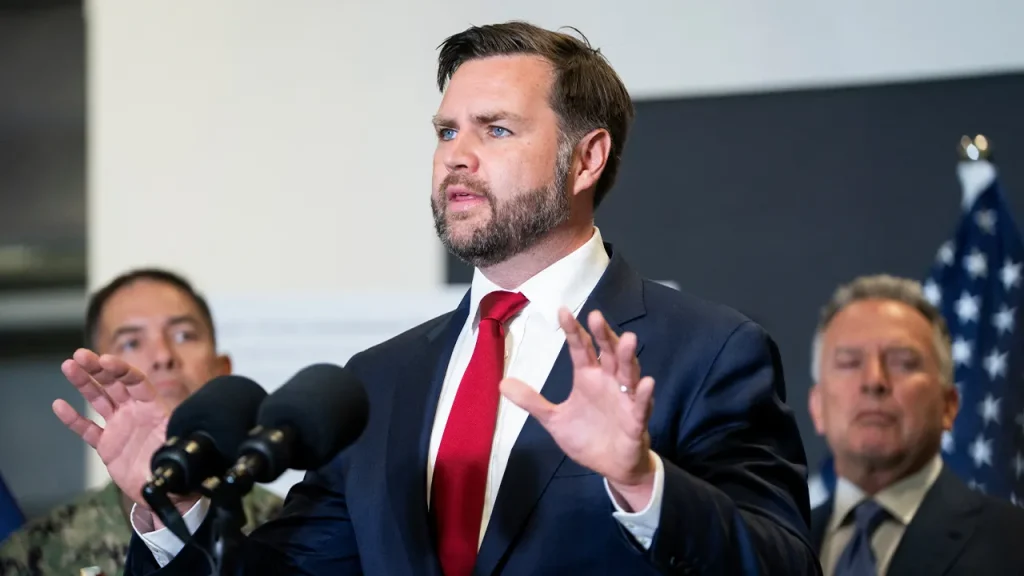Vance Warns Hamas and Voices Optimism for Gaza Ceasefire
Vice President JD Vance delivered a firm warning to Hamas while speaking at the newly established Civilian Military Cooperation Center in southern Israel, a facility integral to the historic ceasefire agreement brokered by the Trump administration. “The terms of the 20-point plan that the president put out are very clear,” Vance stated, explaining that the deal requires Hamas to disarm and behave responsibly. He emphasized that while fighters may receive clemency, they would not be permitted to kill Israelis, each other, or fellow Palestinians. Despite the complex nature of implementing such an agreement between long-standing adversaries, Vance expressed confidence in the peace’s durability, warning that if Hamas fails to cooperate, “Hamas is going to be obliterated.” This message echoed President Trump’s own assertion that non-compliance would result in consequences that would be “fast, furious, and brutal.”
The vice president took a moment to criticize media coverage that seemed eager to interpret any setback as a complete failure of the peace process. “Every time something bad happens and every time that there’s an act of violence, there’s this inclination to say, ‘Oh, this is the end of the ceasefire. This is the end of the peace plan.’ It’s not the end,” Vance insisted. He described such incidents as inevitable bumps in a peace process between groups with deep-seated animosity, adding, “We are doing very well. We are in a very good place.” This pragmatic perspective acknowledges the difficulty of the task while maintaining optimism about its ultimate success. When pressed on a specific deadline for Hamas to comply with disarmament requirements, Vance declined to provide one, noting that President Trump himself had refrained from setting exact timelines due to the unpredictable nature of the situation.
The opening of the Civilian Military Cooperation Center represents a significant milestone in implementing the ceasefire agreement. Navy Admiral Brad Cooper, head of U.S. Central Command, attended the news conference and proudly announced that “two hundred of America’s sons and daughters, who wear the cloth of the nation, have stepped up and are serving here.” Also present was Jared Kushner, who discussed ongoing Gaza reconstruction plans and highlighted what he described as “surprisingly strong coordination between the United Nations and Israel” in delivering aid to Palestinian civilians. Kushner additionally reported progress in recovering the remains of deceased hostages still held in Gaza, an issue of profound importance to many Israeli families affected by the conflict.
Before Vance’s arrival in Israel, several freed hostages met with U.S. Special Envoy Steve Witkoff and Jared Kushner to express their gratitude for the Trump administration’s efforts in securing their release after more than two years in captivity. The Hostages and Missing Families Forum reported that the former captives thanked Witkoff and Kushner for making their freedom a priority. Witkoff later described the meeting as an “emotional moment,” saying, “I didn’t see any victims in that room. I saw strong people who have come out under very difficult circumstances. Their families are reunited, and they are so grateful.” This human dimension underscores the real-life impact of diplomatic achievements that can sometimes seem abstract in news reports.
Throughout his remarks, Vance balanced tough warnings to Hamas with expressions of hope for the peace process. He refused to view setbacks as terminal failures, instead framing them as expected challenges in a difficult reconciliation process. While demanding Hamas comply with disarmament requirements, he avoided setting arbitrary deadlines that might undermine the delicate process. The vice president’s approach suggests an understanding that peace-building requires both firmness and flexibility—clear boundaries coupled with realistic expectations about the time and effort needed to achieve lasting change in a region marked by decades of conflict.
In his closing statements, Vance took a notably personal and spiritual turn, invoking his Christian faith while addressing the prospects for peace in the Holy Land. “I know that Christians have many titles for Jesus Christ, and one of them is the Prince of Peace. And I’d ask all people of faith, in particular my fellow Christians, to pray that the Prince of Peace can continue to work a miracle in this region of the world,” he said. The vice president expressed his desire to visit the Church of the Holy Sepulchre during his time in Israel, connecting his diplomatic mission to the spiritual significance of the region. His remarks reflected a conviction that despite the enormous challenges, the combination of skilled diplomacy, international cooperation, and what he described as “God’s providence” could achieve what many have considered impossible: a lasting peace agreement between Israel and its adversaries.


